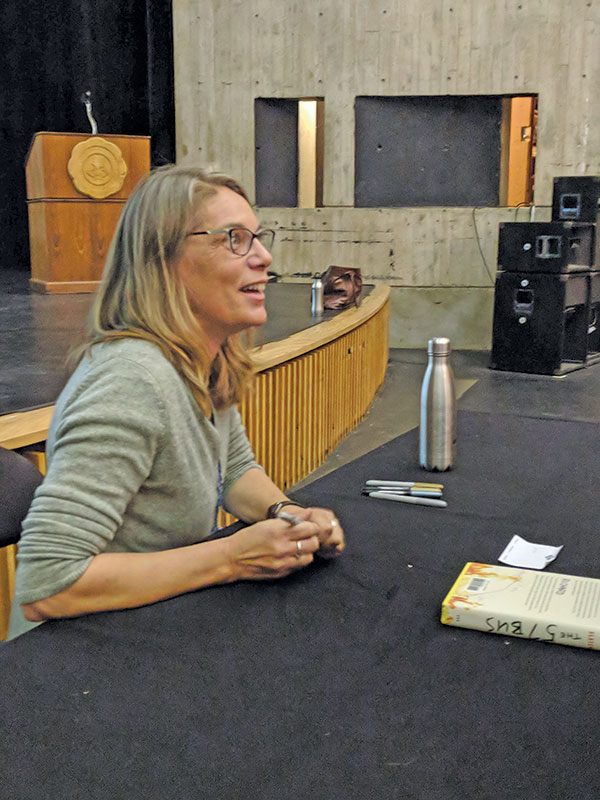26 Months: Slater’s intensive research for “The 57 Bus”
Slater signs books after presentation in Dibden
For many Johnson students, Oakland, California, is very far away. Sasha and Richard’s tale of woe is just as distant. But for Dashka Slater, it was a story close to home. “This crime happened in my neighborhood,” she said. “I live walking distance from where the actual crime occurred.”
And the closeness doesn’t end with just location. The 57 bus is the one that her kid took to Oakland High School, where Richard attended, and she still lives in the same neighborhood as Sasha’s parents. “So it was as local a story as you could possibly imagine,” she said.
“I had been an Oakland reporter at the start of my career. I spent ten years reporting in Oakland, so I had a lot of context,” said Slater. She noted that a big portion of her work is criminal justice reporting. Not only was legal context important, but the geographical area was very familiar.
“Straight-up reporting, that’s my job, has been for many years, so I had both families working with me,” said Slater. At the New York Times, reporters ask for an exclusive so as to keep the many months of reporting on a high-profile crime as organized as possible. “It was 14 months before the New York Times Magazine piece came out,” Slater said.
“So I was interviewing the families and everybody around them,” said Slater, “and when I went back to expand it into a book I had a lot of stuff I hadn’t used in the article.”
Even with all the extra interviews that hadn’t been included, Slater went back and did another 12 months of reporting. “I tend to do very long interviews, so I will usually interview people until they kick me out,” said Slater. “They’re like, ‘Oh, it’s dinner or bedtime. And even then, there’s usually follow-up calls and texting and emailing. I try to warn people when they work with me that I’m going to be their new best friend.”
But talking to the families was not always easy. “Not everybody is in for the long haul,” said Slater. “There’s always a lot of courtship involved in getting people to work with me, and I think it was much more difficult for Richard’s family. For Sasha’s family we actually knew people in common, and we moved in the same white, middle-class circles.”
But Richard’s family was portrayed negatively by a news media that wanted to understand why he had committed such a crime. “Not only was their child being portrayed as a villain, but the whole family had been villainized,” said Slater.
Another step in understanding the crime was understanding Sasha themself. Slater recounted, “I learned a lot as I was researching. I knew nothing about agender and nonbinary identities. I had taken enough gender studies in college to understand the concept, but it was not, in my experience, something that people walked through the world with, so I was really interested in how Sasha came to that understanding of themself.”
“One of the things I wanted to do was share what I had learned,” said Slater. This sharing came in the form of the glossary early on in the book, where the various terms of identity were defined. In coming to understand Sasha, Slater began to piece together the more definite concepts of romantic, sexual, platonic, and gender identities.
“Sasha is just this highly analytical person,” said Slater, “who was able to kind of map their gender identity and their sexuality and their romantic inclination in this kind-of grid format.” Slater’s research then led her to want to share with readers, “particularly ones who might be trying to figure out their own identities.”
Tumblr was a resource for a great deal of these words. The high level of discourse and thought surrounding these words on Tumblr is still a resource, even today, for people looking to find words to define their identity. “On Tumblr, there were these long discussions about defining gray-sexual and the like,” says Slater. These people have taken the language that they possess, and use it to find like people.
Being a human being is like that, says Slater. “Having the language to be just like ‘Am I okay? Is what I am acceptable? Being a person is just figuring out whether your experience is a valid or natural one.”
As time ticked on, Slater took these long interviews and stories of friends and family and wove them together into the final manuscript. A Stonewall Book Award winner from the American Library Association and a finalist for the Young Adult Library Services Association (YALSA) book award, “The 57 Bus” has also rewritten the concepts of gender identity, criminal justice, and forgiveness for its readers.
Slater has also written several books for children, and is hoping to come out with a novel in 2019.

Senior, Journalism & Creative Writing
Grew up in Atkinson, NH
Fall 2018
Along with traditional journalism, I enjoy writing satire and fun feature...



